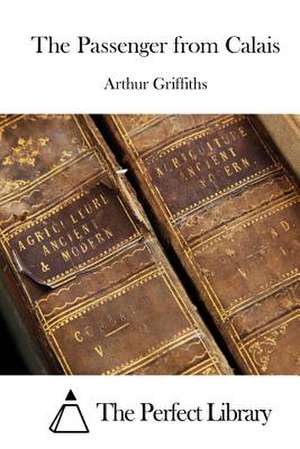The Passenger from Calais
Autor Arthur Griffiths Editat de The Perfect Libraryen Limba Engleză Paperback
| Toate formatele și edițiile | Preț | Express |
|---|---|---|
| Paperback (11) | 47.45 lei 3-5 săpt. | |
| CREATESPACE – | 47.45 lei 3-5 săpt. | |
| CREATESPACE – | 57.89 lei 3-5 săpt. | |
| Resurrected Press – 31 mar 2010 | 70.56 lei 3-5 săpt. | |
| CREATESPACE – | 86.13 lei 3-5 săpt. | |
| CREATESPACE – | 95.98 lei 3-5 săpt. | |
| Europäischer Hochschulverlag – 6 aug 2010 | 182.99 lei 3-5 săpt. | |
| DOGMA Verlag – 6 ian 2013 | 213.74 lei 3-5 săpt. | |
| Alpha Editions – 17 noi 2018 | 55.66 lei 6-8 săpt. | |
| TREDITION CLASSICS – 30 noi 2011 | 83.35 lei 38-44 zile | |
| Echo Library – 31 oct 2006 | 88.66 lei 38-44 zile | |
| Vero Verlag – 18 noi 2019 | 182.69 lei 6-8 săpt. |
Preț: 95.98 lei
Nou
Puncte Express: 144
Preț estimativ în valută:
18.37€ • 19.06$ • 15.35£
18.37€ • 19.06$ • 15.35£
Carte disponibilă
Livrare economică 24 februarie-10 martie
Preluare comenzi: 021 569.72.76
Specificații
ISBN-13: 9781511759533
ISBN-10: 1511759534
Pagini: 118
Dimensiuni: 152 x 229 x 6 mm
Greutate: 0.17 kg
Editura: CREATESPACE
ISBN-10: 1511759534
Pagini: 118
Dimensiuni: 152 x 229 x 6 mm
Greutate: 0.17 kg
Editura: CREATESPACE
Notă biografică
Over 60 novels were written and published by British military officer and novelist Arthur George Frederick Griffiths (9 December 1838 - 24 March 1908) throughout his lifetime. Along with being a military historian and former military writer for The Times, he also wrote extensively about the wars of the 19th century. Griffiths, the second son of Lieutenant-Colonel John Griffiths of the 6th Royal Warwickshire regiment, was born on December 9th, 1838 in Poona, India. On February 13, 1855, Arthur Griffiths enlisted in the British Army as an ensign in the 63rd Regiment of Foot following his graduation from King William's College on the Isle of Man. Griffiths, a Crimean War soldier, took part in the Sevastopol siege. He participated in the Battle of Kinbum and was awarded the British Crimea medal. His later descriptions of crime and punishment in England were ""sensational and grotesque,"" meant to pique his Victorian audience's baser interests.
